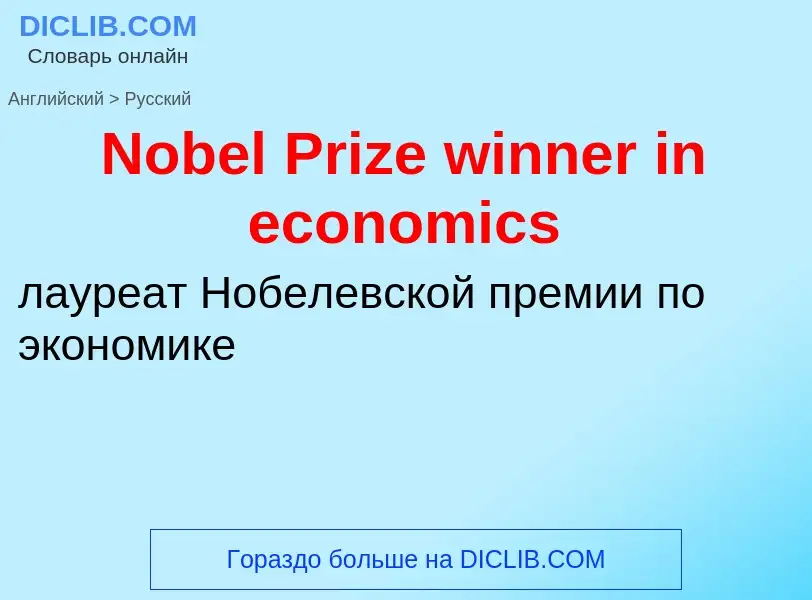Traducción y análisis de palabras por inteligencia artificial ChatGPT
En esta página puede obtener un análisis detallado de una palabra o frase, producido utilizando la mejor tecnología de inteligencia artificial hasta la fecha:
- cómo se usa la palabra
- frecuencia de uso
- se utiliza con más frecuencia en el habla oral o escrita
- opciones de traducción
- ejemplos de uso (varias frases con traducción)
- etimología
Nobel Prize winner in economics - traducción al ruso
Definición
Wikipedia
Since the first award in 1901, conferment of the Nobel Prize has occasionally engendered criticism and controversy. After his death in 1896, the will of Swedish industrialist Alfred Nobel established that an annual prize be awarded for service to humanity in the fields of physics, chemistry, physiology or medicine, literature, and peace. Similarly, the Sveriges Riksbank Prize in Economic Sciences in Memory of Alfred Nobel is awarded along with the Nobel Prizes.
Nobel sought to reward "those who, during the preceding year, shall have conferred the greatest benefit on mankind". One prize, he stated, should be given "to the person who shall have made the most important 'discovery' or 'invention' within the field of physics". Awards committees have historically rewarded discoveries over inventions: up to 2004, 77 per cent of Nobel Prizes in physics have been given to discoveries, compared with only 23 per cent to inventions. In addition, the scientific prizes typically reward contributions over an entire career rather than a single year.
No Nobel Prize was established for mathematics and many other scientific and cultural fields. An early theory that envy or rivalry led Nobel to omit a prize to mathematician Gösta Mittag-Leffler was refuted because of timing inaccuracies. Another myth that states that Nobel's spouse had an affair with a mathematician (sometimes attributed as Mittag-Leffler) has been equally debunked; Nobel was never married. A more likely explanation is that Nobel did not consider mathematics as a practical discipline, and too theoretical to benefit humankind, as well as his personal lack of interest in the field and the fact that an award to mathematicians given by Oscar II already existed at the time. Both the Fields Medal and the Abel Prize have been described as the "Nobel Prize of mathematics".
The most notorious controversies have been over prizes for Literature, Peace, and Economics. Beyond disputes over which contributor's work was more worthy, critics most often discerned political bias and Eurocentrism in the result. The interpretation of Nobel's original words concerning the Literature prize has also undergone repeated revisions.
A major controversies-generating factor for the more recent scientific prizes (Physics, Chemistry, and Medicine) is the Nobel rule that each award can not be shared by more than two different researches and no more than three different individuals each year. While this rule was adequate in 1901, when most of the science research was performed by individual scientists working with their small group of assistants in relative isolation, in more recent times science research has increasingly become a matter of widespread international cooperation and exchange of ideas among different research groups, themselves composed of dozens or even hundreds of researchers, spread over the years of effort needed to hypothesize, refine and prove a discovery. This has led to glaring omissions of key participants in awarded researches: as an example see below the case of the 2008 Nobel Prize for Physics, or the case of the Atlas/CMS Collaboration that produced the scientific papers that documented the Higgs boson discovery and included a list of researchers filling 15 single-spaced pages.

![[[Albert Einstein]], awarded a single 1921 Prize out of numerous nominations. [[Albert Einstein]], awarded a single 1921 Prize out of numerous nominations.](https://commons.wikimedia.org/wiki/Special:FilePath/Albert Einstein Head.jpg?width=200)
![[[Mohandas Karamchand Gandhi]] (Mahatma Gandhi) – "a role model for the generations to come" (Albert Einstein on Gandhi) [[Mohandas Karamchand Gandhi]] (Mahatma Gandhi) – "a role model for the generations to come" (Albert Einstein on Gandhi)](https://commons.wikimedia.org/wiki/Special:FilePath/MKGandhi.jpg?width=200)
![[[Orhan Pamuk]], winner of the 2006 Nobel Prize in Literature [[Orhan Pamuk]], winner of the 2006 Nobel Prize in Literature](https://commons.wikimedia.org/wiki/Special:FilePath/Orhan Pamuk3.jpg?width=200)
![[[Satyendra Nath Bose]] in 1925 [[Satyendra Nath Bose]] in 1925](https://commons.wikimedia.org/wiki/Special:FilePath/SatyenBose1925.jpg?width=200)

